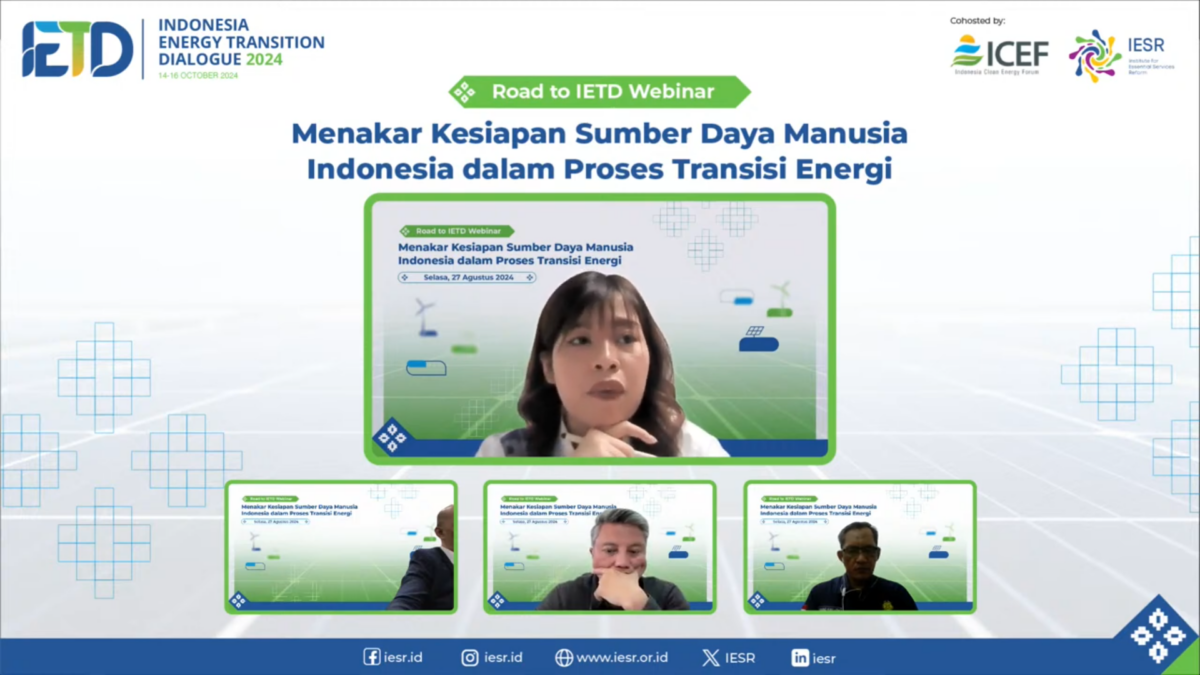Jakarta, August 27, 2024 – In addition to the massive transformation of the energy system, the energy transition will bring changes to the economic system including employment. Employment is a crucial and sensitive issue for the government because this sector will have implications for economic growth. To face the energy transition era, systematic planning and preparation are needed for the employment sector.
Fabby Tumiwa, Executive Director of the Institute for Essential Services Reform (IESR) in a webinar entitled “Measuring the Readiness of Indonesian Human Resources in the Energy Transition Process”, stated that by 2050, there will be major changes in the employment landscape in Indonesia.
“3.2 million new jobs will be created in 2050, of which 1.2 million will be created in technical-based jobs. There are four sectors: solar, wind, Bio energy, and hydro. The IESR study shows that the jobs that emerge will be greater than the jobs that are lost,” said Fabby.
Facing this, curriculum adjustments are needed to be more in line with future industry needs.
Ahmad Khulaemi, Senior Lecturer, Ministry of Energy and Mineral Resources stated that his party is encouraging two strategies for improving human resources in facing the energy transition.
“We encourage training and certification. This training covers the electricity, renewable energy and energy conservation sub-sectors. Meanwhile, for certification, there are two certification institutions, namely the Competency Certification Institute (LSK) PPSDM EBTKE and the Professional Certification Institute (LSP) BPSDM ESDM,” he said.
Examples of technical training and certification are the operation and maintenance of solar PV with various materials, such as identification and handling of solar PV, as well as training and services for electric motor conversion services.
Adi Nuryanto, Director of Partnership and Alignment of the Business World and Industry, Ministry of Education, Culture, Research and Technology agreed that this energy transition brings opportunities as well as challenges, because there is a gap between industry needs and education curriculum.
“We are carrying out a number of collaborations with industry including internships, joint curriculum preparation, industry practitioners teaching, project-based learning, competency certification, applied research, commitment to workforce absorption, and sharing updates from industry for vocational education,” he said.
The Ministry of Education, Culture, Research and Technology has also prepared a roadmap for the transformation of vocational education, including improving the quality and relevance of vocational education, harmonizing quality and relevance, coordinating regulations and policies.
Aria Nagasastra, Executive Director of Koaksi Indonesia, said that a more integrated scientific approach is needed in dealing with green jobs.
“We see the need to strengthen knowledge that is not only directly from vocational techniques, but also fundamental. We want that with the (transition) of renewable energy, the workforce can get broad opportunities and high positions as high as possible,” said Aria.
Aria added that the roadmap that has been made by MEMR and the green jobs roadmap made by Bappenas must be continuously reviewed and updated according to the developing situation.
Deon Arinaldo, Manager of the IESR Energy Transformation Program, emphasized that the energy transition is a transformation of the value chain as a whole, and Indonesia must be actively involved in the transformation process in order to reap maximum benefits from the energy transition.
“Indonesia needs to identify strategic value chains in this economic transformation where Indonesian human resources must excel in order to master the value chain. For example, floating PLTS, not only in the adoption of PLTS, but also floaters, maintenance, and other components. Indonesian human resources must be prepared starting from skilled workers to researchers,” said Deon.
This webinar is a pre-event for the Indonesia Energy Transition Dialogue 2024 which will take place on 7-8 October 2024 with the theme “Delivering Just and Orderly Energy Transition”. Find out more and register at ietd.info

